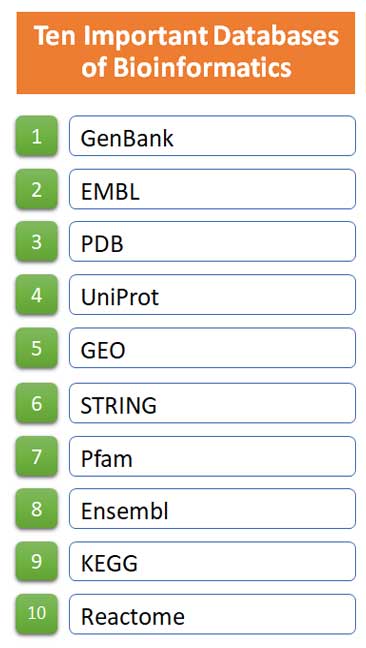As a Bioinformatics student, you will be working with vast amounts of data generated from various sources. Databases play a crucial role in organizing and storing this data, enabling efficient retrieval and analysis. Here is the quick list of Ten Essential Biology Databases every Bioinformatics student should be familiar with..

GenBank
Ø GenBank is the most comprehensive database of genetic sequences, including DNA and RNA sequences, protein sequences, and sequence annotations.
Ø GenBank is maintained by the National Center for Biotechnology Information (NCBI).
Ø URL: https://www.ncbi.nlm.nih.gov/genbank/
EMBL
Ø EMBL: European Molecular Biology Laboratory
Ø EMBL is the Nucleotide Sequence Database
Ø It is a comprehensive collection of primary nucleotide sequences maintained at the European Bioinformatics Institute (EBI).
Ø URL: http://www.ebi.ac.uk/embl/index.html
PDB
Ø PDB: Protein Data Bank
Ø PDB is a database of three-dimensional structures of proteins and other molecules.
Ø It provides information about the structures of proteins and their interactions with other molecules.
Ø URL: https://www.rcsb.org/
UniProt
Ø UniProt is a comprehensive database of protein sequences and functional information.
Ø It provides detailed information about the functions, properties, and interactions of proteins.
Ø URL: https://www.uniprot.org/
GEO
Ø GEO: Gene Expression Omnibus
Ø GEO is a database of gene expression data from various experiments and studies.
Ø It provides a valuable resource for studying the regulation of gene expression and identifying potential drug targets.
Ø Maintained by NCBI.
Ø URL: https://www.ncbi.nlm.nih.gov/geo/
STRING
Ø STRING is the Search Tool for the Retrieval of Interacting Genes/Proteins.
Ø STRING is a database of protein-protein interactions and functional associations.
Ø It provides a valuable resource for studying the function and regulation of proteins.
Ø URL: https://string-db.org/
Pfam
Ø Pfam is a database of protein families, which groups proteins based on their structural and functional similarities.
Ø It provides a valuable resource for predicting the function of newly discovered proteins.
Ø URL: http://pfam.xfam.org/
Ensembl
Ø Ensembl is a genome annotation database that provides information on the location, structure, and function of genes in various organisms, including humans, mice, and plants.
Ø URL: https://asia.ensembl.org/index.html
KEGG
Ø KEGG: Kyoto Encyclopaedia of Genes and Genomes.
Ø KEGG is a comprehensive database of biological systems, including pathways, interactions, and gene networks.
Ø It provides valuable insights into the function and regulation of genes and metabolic pathways.
Ø URL: https://www.genome.jp/kegg/
Reactome
Ø Reactome is a database of biological pathways and processes.
Ø It provides a comprehensive resource for studying the regulation of cellular processes and identifying potential drug targets.
Ø URL: https://reactome.org/
These ten databases are essential resources for Bioinformatics students, providing a wealth of information on genetic sequences, protein structures, gene expression data, biological pathways, and more.
<<< Back to BIOINFORMATICS Notes Page
Dear readers
I hope you have enjoyed reading this article and finding the content informative. We believe that this article helped you to understand the Important Databases of Bioinformatics. I would like to take this opportunity to request your comments on the topics I have covered. Whether you have a suggestion, a question about the topic, or simply want to share your thoughts, I would love to hear from you. Your comments provide me with the opportunity to engage in meaningful discussion and continue to write with the best possible content in Biology.
So, please don’t hesitate to leave a comment below. I appreciate your support and look forward to hearing from you.
Best regards, [Admin, EasyBiologyClass]
